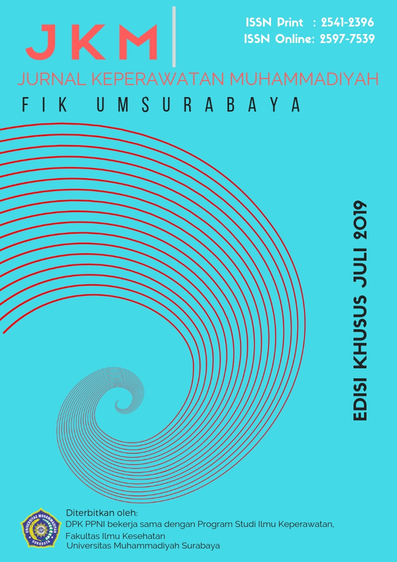Evaluasi Pelaksanaan Program Pelayanan Kesehatan Peduli Remaja (PKPR) Di Puskesmas Rangkah
DOI:
https://doi.org/10.30651/jkm.v4i2.2025Keywords:
Analysis Implementation Program, Health Services, Care, Adolescent,Abstract
The most common problems experienced by adolescents are reproductive health problems including unwanted pregnancy (KTD), abortion, sexually transmitted infections (STIs) including Human Immunodeficiency Virus (HIV), sexual violence, and the problem of limited access to health information and services about health reproduction. The Ministry of Health of the Republic of Indonesia has developed a youth health program in Indonesia through the Youth Care Health Service (PKPR) since 2003 in health care. The Youth Care Health Care Program (PKPR) in the city of Surabaya began in 2010 at the Rangkah health center, then in the following year it developed. The problem raised in this study is the low percentage of coverage of the implementation of the PKPR program in Rangkah. The approach that will be used in examining the program implementation is seen from the input, process, and output components by looking at the 2014 PKPR National Standards Guidelines.
Objective: Â This study aims to analyze the implementation of PKPR (Youth Care Health Services) program at Rangkah health center using a system based approach national standard of PKPR.
Methods: Â This research uses descriptive research with a qualitative approach. The informant source was chosen purposively purposely selected by the researcher for the subject based on several criteria by adjusting to the objectives.
Results: Â The results showed that the implementation of the PKPR program at the Rangkah Health Center was still not nationally standard. In addition, training for health center PKPR officers is still not routine in the implementation of both at the Rangkah health center. The Rangkah health center has collaborated in the implementation of PKPR programs across sectors, across programs and with certain NGOs
Conclusion: Â Â The implementation of the Rangkah Puskesmas PKPR program is in accordance with the national standard guidelines set by the Ministry of HealthReferences
Olyai , D. R., 2015. National Project of the Adolescent Health Committee FOGSI under the guidelines made in accordance with theGovernment of India guidelines (RCH II – ARSHImplementation Guide of Ministry of Health and Family Welfare) in consultation with WHO., India: Adolescent Friendly Health Centers India. Pembaharuan Desa (FPPD) dan ACCESSFaloutsos, M.; Karagiannis, T.; Moon, S.; , "Failure of syngeneic bone-marrow graft without preconditioning in post-hepatitis marrow aplasia," International Journal of Publich Health , vol.24, no.5, pp.4-5, September-October 2010.
BKKBN., 2010. Departemen Kesehatan dan Macro Internasional; Survey Kesehatan Reproduksi Remaja. Tahun 2007. Jakarta.
Maestra, M., 2014. Karateristik Layanan Kesehatan Ramah REMAJA di PKPR. Jurnal Ekologi Kesehatan,[e-jurnal]: Vol. 15 (1) : 66 – 75. Tersedia di: <http://pkbi-diy.info/?p=3311>[diakses tanggal 10 Desember 2017].
Bungin, B., 2001. Metodologi penelitian sosial: format-format kuantitatif dan kualitatif. Surabaya: Erlangga.
Pratiwi. (2017). Analisa Implementasi Program Pelayanan Kesehatan Peduli Remaja (PKPR) di Puskesmas Kota Palembang.Tesis. Program Studi Ilmu Kebidanan Program Pasca Sarjana Universitas Aisyiyah Yogyakarta.
Departemen Kesehatan RI. 2003. Pedoman Perencanaan Pembentukan Dan Pengembangan Puskesmas Pelayanan Kesehatan Peduli Remaja Di Kab/Kota. Jakarta: Departemen Kesehatan RI.
Departemen Kesehatan RI. 2003. Pedoman Perencanaan Pembentukan Dan Pengembangan Puskesmas Pelayanan Kesehatan Peduli Remaja Di Kab/Kota. Jakarta: Departemen Kesehatan RI
Muthmainnah. 2013. Analisis Stakeholder Remaja terhadap Implementasi Program Pelayanan Kesehatan Peduli Remaja (PKPR) diKota Semarang. Jurnal Promkes. 1(2): 170-183.
Downloads
Published
Issue
Section
License
- Penulis tetap memegang hak atas karyanya dan memberikan hak publikasi pertama kepada jurnal ini yang secara simultan karya tersebut dilisensikan di bawah:Â Creative Commons Attribution-ShareAlike 4.0 International (CC BY-SA 4.0)













